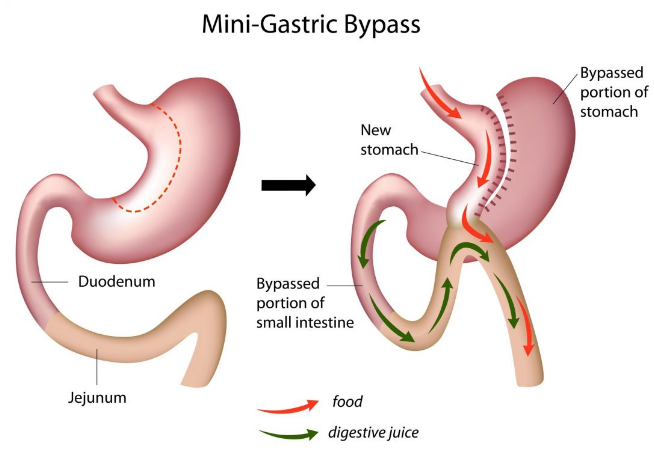Transform Your Life with Single Anastomosis Gastric Bypass: Experience Remarkable Weight Loss Results and Improved Health through Expert Surgical Care

The single anastomosis gastric bypass, also called the omega loop or mini bypass, is a procedure where a small gastric pouch is formed by dividing the stomach, and a loop of the small bowel is bypassed and connected to the lower part of the newly formed gastric pouch. The procedure is typically performed laparoscopically, through a number of small incisions on the abdomen, under a general anaesthetic. The surgery takes around 1.5 to 2 hours.

The sleeve gastrectomy is a restrictive procedure. By restricting the size of your stomach, the amount you can eat is limited. Additionally, the hunger-producing hormone, Ghrelin, is mainly created in the stomach. After surgery, the Ghrelin drops significantly, which reduces your food craving.
Studies have found that at one year after surgery, patients have lost 68% of their excess weight. At five years after surgery, patients have lost 53.2% of their excess weight. These amounts are averages, and the amount of weight loss varies from individual to individual.
Source: M. Golzarand et al. “Surg. Endos.”, 2017.
Typically 1 to 2 nights. You may require longer if you have a complex health history.
The sleeve gastrectomy has a low complication rate, however every surgery has risks.
Short term risks can include:
Long term risks can include:
Though it may seem daunting, the benefits of the surgery often outweigh the risks. Both risks and benefits should be assessed when considering surgery.
Information on surgery costs can be found on the Our Costs page.
Yes, you will need a referral to see Dr Puhalla. A referral from your GP is valid for 12 months, while a referral from a specialist is valid for 3 months.
The initial consultation costs $250, with a Medicare rebate of $76. The pre-operative appointment costs $90, with a Medicare rebate of $38. You will need a valid referral to claim the Medicare rebates.
No, weight loss surgery is not currently available in the public health system.
Yes, Dr Puhalla accepts uninsured patients. You can apply to the ATO for early release of your super, for which we can assist you. Medicare rebates are available for some fees, however you are liable for all costs.
Unfortunately, Medicare and health fund rebates do not cover the full cost of providing you with medical care. This is because the rate at which successive governments have indexed the Medicare Schedule fees has been substantially lower than increases in the Consumer Price Index (CPI) and average weekly earnings. The reality is that Medicare rebates do not cover the cost of providing you with a safe and high quality service. The fees charged by this practice have to cover all of our practice costs.
Please bring a copy of your referral, along with your personal details, including Medicare card, private health insurance, and a list of medications. You will need to fill out personal details and medical history forms on arrival.
Yes, it is essential that you see a dietitian to support you on your weight loss surgery journey. This is to ensure that you have the best possible outcome relating to your weight loss and overall health.
Dr Puhalla will discuss your options with you to help you decide the best procedure for you. Your individual preferences, lifestyle and health are considered when determining your type of surgery.
Dr Puhalla will discuss your options with you to help you decide the best procedure for you. Your individual preferences, lifestyle and health are considered when determining your type of surgery.
Typically, the hospital stay is one to two nights. If you are undergoing revisional surgery or have a complex medical history, you may need to stay longer.
Depending on the procedure, you will need one to two weeks off work. We can provide you with a medical certificate if required.
We recommend you start driving a week after surgery, initially limiting yourself to shorter drives before returning to normal driving.
Current wait times are around three to four weeks for appointments and surgery bookings. We also have a cancellation list, as patients often have to move their appointments, which means you may be able to be seen sooner. Please advise our team at the time of booking if you would like to put on the cancellation list.
The entire process typically takes around 8 to 12 weeks. Depending on the investigations needed, and whether or not you have private health insurance, this may be able to be shortened to around 4 weeks. We will do our best to meet your schedule, however we recommend you allow at least 8 weeks for the entire process.